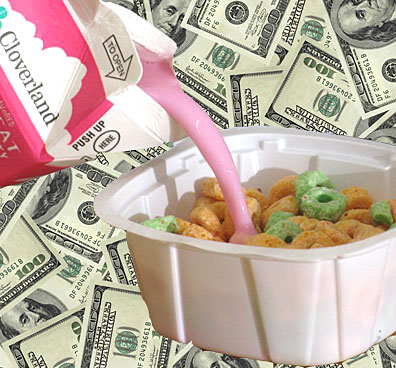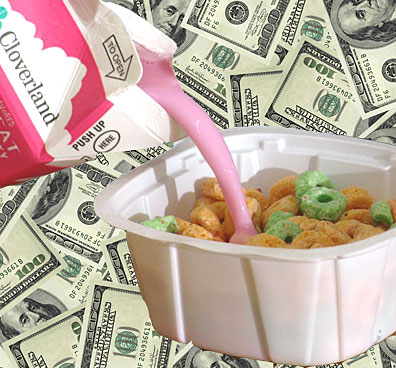 D.C. Public Schools in the last two years have taken in more than $1 million in corporate rebates — referred to by some as “kickbacks” — paid by giant food manufacturers as an inducement to place their brands on kids’ cafeteria trays at school.
D.C. Public Schools in the last two years have taken in more than $1 million in corporate rebates — referred to by some as “kickbacks” — paid by giant food manufacturers as an inducement to place their brands on kids’ cafeteria trays at school.
Documents I obtained through the Freedom of Information Act show that Chartwells, the company hired by D.C. Schools to provide food services at 122 schools across the city, through February of this year had declared $1,076,738 in rebates it received since its contract began in the fall of 2008. That represents 5 percent of the $18.7 million in purchases Chartwells billed the school system during that period. Under federal law, Chartwells is required to credit D.C. schools for any rebates it receives.
Food manufacturers use the rebates as an incentive to entice purchasing agents to buy certain products over others for school meals. Rebates sometimes are referred to as “kickbacks” because powerful food service companies such as Chartwells expect to receive them, much the way grocers expect manufacturers to pay to have their goods displayed prominently on supermarket shelves.
Critics charge that the rebates — also referred to as “volume discounts” or “buy backs” — act as a tool in the campaign to imprint processed and often sugary food brands in the minds of young children. Rebates help explain why kids in D.C. schools routinely are served sugary cereals such as Kellogg’s Apple Jacks and snacks like Kellogg’s Pop-Tarts, Otis Spunkmeyer muffins, Pepperidge Farm Giant Goldfish Grahams, and flavored milk from Cloverland Dairy that has nearly as much sugar as Coke or Mountain Dew.
“There’s big money tied up in big company food and agribusiness. There’s not a whole lot of money tied up in fresh vegetables and fruits. So just follow the money. That’s what’s being given to kids.”
It could not be immediately determined from the documents which manufacturers paid the rebates to D.C. Schools or in what amounts. Under U.S. Department of Agriculture rules governing the federally-subsidized school meals program, food service providers such as Chartwells are required to itemize the rebates they receive only when schools ask them to do so. Otherwise, the rebates appear simply as a lump-sum line item on the monthly invoices Chartwells submits to D.C. Public Schools for reimbursement.
Although the school system’s newly hired food services director, Jeffrey Mills, was said to be disturbed by the potentially corrosive effect rebates might have on D.C. school food purchases, apparently no one in the DCPS hierarchy had ever asked Chartwells for a breakdown of where the rebates come from. On May 28, I filed a second Freedom of Information Act request for an itemization of rebates received by Chartwells. Schools spokeswoman Jennifer Calloway last Thursday said DCPS has since asked Chartwells for a breakdown, but has not yet received one.
Navigating by compass
Much like rebates in the consumer world, rebates in the multi-billion-dollar universe of corporate food service are awarded by manufacturers after products are purchased. For instance, after a truckload of cereal is delivered, the purchasing company — Chartwells, in this case — would apply for the rebate and later receive a check. Chartwells, Sodexo, and Aramark — the two other companies most prominent in the field — deal in rebates worth millions.
Chartwells is part of a huge, publicly traded international food services conglomerate based in the United Kingdom, the Compass Group, that reports annual sales of $9.3 billion. Chartwells provides the food each day for 2.5 million kids in more than 500 school districts across the U.S. Other affiliated companies in the group — Bon Appetit, Restaurant Associates, Thompson Hospitality, Morrison Management, Wolfgang Puck Catering, to name a few — handle the food served in universities, corporate campuses, museums, and all sorts of public and private venues, even oil drilling platforms nationwide.
All these Compass Group subsidiaries share a procurement operation that negotiates food purchases — and rebates — for the entire group. Called Foodbuy, and based along with Compass Group’s North American headquarters in Charlotte, N.C., Foodbuy bills itself as “the nation’s largest group purchasing organization,” dealing in more than $5 billion worth of goods annually.
Between 35 and 40 Foodbuy employees are engaged full-time in negotiating contracts and rebates with manufacturers. Rebates become a major driver of purchasing decisions, said Ken Jaycox, vice-president for category development at Foodbuy. “We’re focused on net cost,” Jaycox said. “Our job is to try and get the best net cost for our customers.”
Jaycox suggested that the choice of foods served in school cafeterias is determined less by the rebates manufacturers offer than by negotiations between schools and Chartwells representatives over which foods are the best choices, and how they balance against the local food budget. But Rick Hughes, who spent eight years as a manager for Sodexo in Colorado, said performance evaluations were based in part on how well Sodexo employees adhered to the company’s choice of products, determined in large part by manufacturer rebates.
“We were rewarded for purchasing specific products,” said Hughes, who now works the other side of the fence, as food services director of Colorado Spring School District 11. “Especially if the company is mandating that you buy their foods, absolutely that’s what food service directors are buying,” Hughes said. “There’s big money tied up in big company food and agribusiness. There’s not a whole lot of money tied up in fresh vegetables and fruits. So just follow the money. That’s what’s being given to kids.”
As prevalent and influential as they may be, rebates are treated as a kind of third rail in school food services. Food manufacturers are loathe to talk about them.
Why all the secrecy? The big food service companies — Chartwells, Sodexo, Aramark — were taking in hundreds of millions of dollars in rebates annually in ways that ended up costing customers money by focusing food purchases on large, national brands that can afford to give hefty discounts, rather than smaller, local companies that sell their goods more cheaply.
Kellogg, with $13 billion in annual sales, is prominently represented in D.C. school cafeterias by its Apple Jacks, Raisin Bran, Frosted Mini-Wheats, and other cereals, as well as treats such as Pop-Tarts, all highly processed and laced with sugar. I first contacted the company via its “media hotline” on May 28 and posed questions about its rebate practices. When there was no response, I called again on June 15 and a third time on June 28, at which point I was asked to submit my questions in an email.
On June 29, I received this reply from a Susanne Norwitz at Kellogg:
With 14,000-plus school districts, there may be some exceptions — but overall, this is how the process works. The USDA sets the nutritional guidelines that schools follow to receive reimbursement from the government. The individual school boards may set additional specifications above and beyond the USDA requirements. Determinations about what cereals are offered in schools are based on these specifications — and rebates to the schools are intended to assist them in meeting their menu-cost requirements.
Otis Spunkmeyer muffins, usually wrapped in plastic and warmed in a school kitchen steamer, also appear with some regularity as a D.C. school breakfast option. When I called the company headquarters in San Leandro, Calif., I was referred to a public relations firm in Missouri, the DEEP Group. Stephanie Heart, the DEEP representative I spoke with, was quite chatty at first, saying she was absolutely familiar with rebate practices from her years working in the food industry. “You’d be surprised how much like consumer rebates they are,” she said.
But Heart clammed up fast after she called her client, Otis Spunkmeyer, to pursue my questions. “Everything is confidential. There’s not any information we can give you at this time,” she said. “I don’t think it’s a secret, but it’s just not something they [Otis Spunkmeyer] can share because of client confidentiality.”
Pepperidge Farm, the maker of Giant Goldfish Grahams, a breakfast staple in D.C. food lines, referred me to a representative, Frances Sirico, in Norwalk, Conn. Some weeks after talking to Sirico by telephone, I received a curt email stating: “Your request has been forwarded to our legal department. When I receive further information, I will contact you.”
I left several messages for James Cella, general manager at Cloverland Dairy in Baltimore, the main milk supplier for D.C. Schools. On June 28, I received an email from Cella, saying, “In response to your question — Cloverland serves some of the D.C. schools thru a contract cafeteria management company. We currently do not deal directly w/the schools, and do not invoice the schools. The best group to answer your question would be Compass Food group, and the other café mgt. companies D.C. has contracted with.”
Pay-to-play hurts smaller players
So why all the secrecy? A March 2009 article in In These Times magazine calculated that the big food service companies — Chartwells, Sodexo, Aramark — were taking in hundreds of millions of dollars in rebates annually in ways that ended up costing customers money by focusing food purchases on large, national brands that can afford to give hefty discounts, rather than smaller, local companies that sell their goods more cheaply.
“The money involved is massive,” In These Times reported. “Charles C. Kirby, former USDA regional director for child nutrition in Atlanta, says he ran a Mississippi Education Department cooperative buying program from 1992 to 2001. He dealt directly with companies such as Heinz and Kellogg’s and received rebates ranging from 10 percent to 50 percent. In the last year, his rebates were $15 million out of $90 million in purchasing.”
A 2002 audit by the U.S. Department of Agriculture found that in a sample of Midwestern school districts, food service companies routinely ignored the rule that requires them to pass on to the schools any rebates they receive. They were just pocketing the money. In 2008, the USDA beefed up its rule on rebates, requiring that school contracts with food service companies clearly state that any rebates received by the companies will be credited to the schools.
Despite the new rules, it’s widely assumed in food service circles that the big players — Chartwells, Sodexo, Aramark — are not declaring all of the rebates to which school districts are entitled, hence the shroud of secrecy.
When I put that to Foodbuy’s Ken Jaycox, he replied without a trace of irony, “I’m shocked and surprised by that allegation.”
But Robert Pritsker, a New York City restaurateur who unsuccessfully sued Chartwells, Sodexo, and Aramark in federal court, claiming the food service giants had since the 1990s improperly withheld at least $1 billion in rebates from schools, said the 5 percent rebate figure Chartwells has declared in D.C. sounds too small. In his own school district of Weston, Conn., Pritsker said Chartwells claims at least 15 percent in rebates.
Jaycox responded that there are many factors that could explain the wide difference in rebate percentages reported by Chartwells in two different school districts.
There’s enough intrigue and money surrounding the rebate question — and the role of corporate discounting in feeding popular but nutritionally dubious foods to millions of children in the federal meals program — that attorneys general in some states have taken notice. It may be less of an issue in D.C. schools in the coming year. Officials have decided to discontinue serving flavored milks and sugary cereals. But they have yet to answer questions about the future of Pop-Tarts, Otis Spunkmeyer muffins, and Giant Goldfish Grahams.




